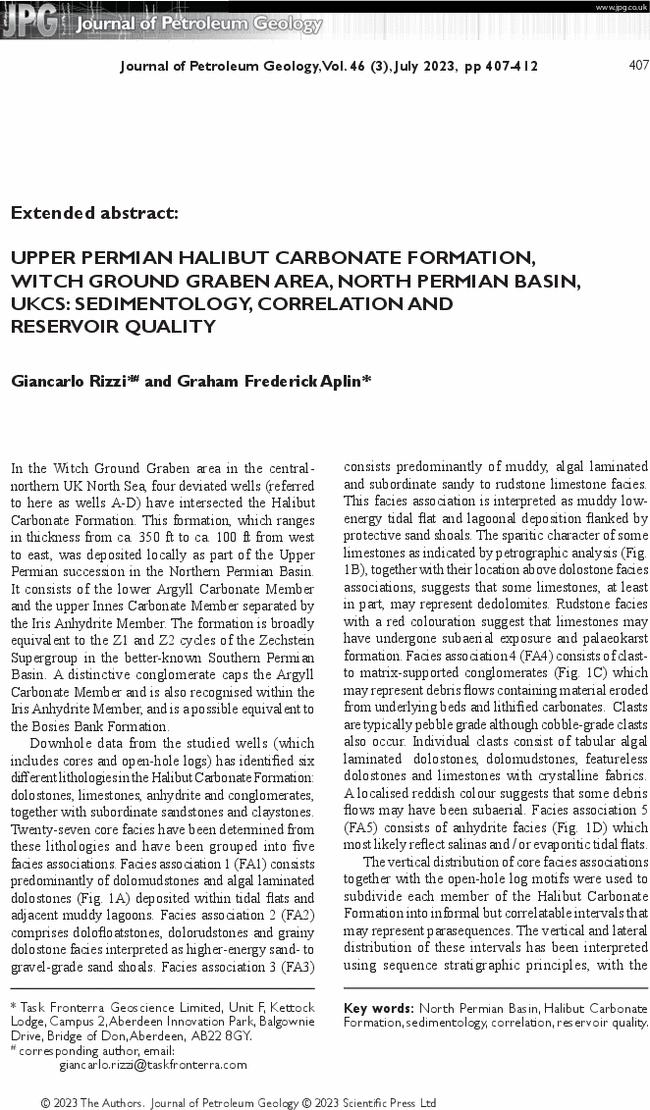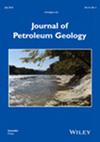Extended abstract: UPPER PERMIAN HALIBUT CARBONATE FORMATION, WITCH GROUND GRABEN AREA, NORTH PERMIAN BASIN, UKCS: SEDIMENTOLOGY, CORRELATION AND RESERVOIR QUALITY
IF 1.8
4区 地球科学
Q3 GEOSCIENCES, MULTIDISCIPLINARY
引用次数: 0
Abstract
In the Witch Ground Graben area in the centralnorthern UK North Sea, four deviated wells (referred to here as wells A-D) have intersected the Halibut Carbonate Formation. This formation, which ranges in thickness from ca. 350 ft to ca. 100 ft from west to east, was deposited locally as part of the Upper Permian succession in the Northern Permian Basin. It consists of the lower Argyll Carbonate Member and the upper Innes Carbonate Member separated by the Iris Anhydrite Member. The formation is broadly equivalent to the Z1 and Z2 cycles of the Zechstein Supergroup in the better-known Southern Permian Basin. A distinctive conglomerate caps the Argyll Carbonate Member and is also recognised within the Iris Anhydrite Member, and is a possible equivalent to the Bosies Bank Formation. Downhole data from the studied wells (which includes cores and open-hole logs) has identified six different lithologies in the Halibut Carbonate Formation: dolostones, limestones, anhydrite and conglomerates, together with subordinate sandstones and claystones. Twenty-seven core facies have been determined from these lithologies and have been grouped into five facies associations. Facies association 1 (FA1) consists predominantly of dolomudstones and algal laminated dolostones (Fig. 1A) deposited within tidal flats and adjacent muddy lagoons. Facies association 2 (FA2) comprises dolofloatstones, dolorudstones and grainy dolostone facies interpreted as higher-energy sandto gravel-grade sand shoals. Facies association 3 (FA3)

扩展摘要:英国北二叠统盆地冲沟地面地堑区上二叠统哈雷巴特碳酸盐岩组:沉积、对比与储层质量
在英国北海中北部的Witch Ground Graben地区,四口斜井(此处称为A-D井)与Halibut碳酸盐岩地层相交。该地层的厚度从约350英尺到约100英尺不等,从西到东,是作为北二叠纪盆地上二叠纪序列的一部分局部沉积的。它由下部Argyll碳酸盐岩段和上部Innes碳酸盐岩段组成,由Iris硬石膏段分隔。该地层大致相当于著名的南二叠纪盆地中的泽克斯坦超群的Z1和Z2旋回。一个独特的砾岩覆盖了Argyll碳酸盐岩段,也被认为是Iris硬石膏岩段,可能相当于Bosies Bank组。研究井的井下数据(包括岩心和裸眼测井)确定了哈利布特碳酸盐岩组中的六种不同岩性:白云岩、石灰岩、硬石膏和砾岩,以及次级砂岩和粘土岩。根据这些岩性确定了27个岩芯相,并将其分为五个相组合。相组合1(FA1)主要由沉积在潮坪和邻近泥质泻湖内的白云岩和藻层白云岩组成(图1A)。岩相组合2(FA2)包括白云岩、白云岩和粒状白云岩相,被解释为高能砂砾石级砂滩。相关联3(FA3)
本文章由计算机程序翻译,如有差异,请以英文原文为准。
求助全文
约1分钟内获得全文
求助全文
来源期刊

Journal of Petroleum Geology
地学-地球科学综合
CiteScore
3.40
自引率
11.10%
发文量
22
审稿时长
6 months
期刊介绍:
Journal of Petroleum Geology is a quarterly journal devoted to the geology of oil and natural gas. Editorial preference is given to original papers on oilfield regions of the world outside North America and on topics of general application in petroleum exploration and development operations, including geochemical and geophysical studies, basin modelling and reservoir evaluation.
 求助内容:
求助内容: 应助结果提醒方式:
应助结果提醒方式:


